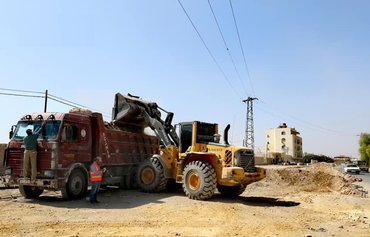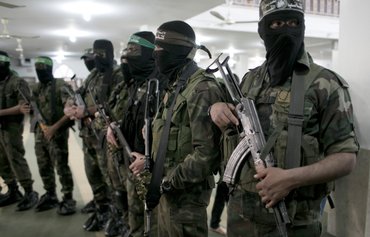Iran’s support for the Syrian regime has unleashed unprecedented sectarianism and facilitated the spread of extremist ideology and groups, which have found a safe haven in Syrian territories, analysts told Al-Shorfa.
The terrorism that Iran has fueled in Syria is also spilling over to regional countries and the world as militants expand their areas of potential targets, they said.
It is not possible to understate the impact of Iranian intervention and their affiliated militias--led by Hizbullah--on sectarianism, said Syrian opposition figure Luay al-Meqdad, head of the Syrian organisation Masarat and former member of the Syrian National Coalition.
"The Iranian regime and its militias have used the sectarian weapon to mobilise people and ship them to battlefields of their choosing," he told Al-Shorfa.
Al-Meqdad, who also is a former spokesman for the Free Syrian Army (FSA), said the aim of Iran's involvement is to impose its influence on the region or at minimum use its presence in Syria "as leverage to achieve gains on other issues when the time comes".
"It is certain that the Iranian intervention and militias brought to Syria by Tehran extended the lifespan of Bashar al-Assad's regime," he said, adding that the deal Iran's leaders made with al-Assad in terms of how "the battle is to be conducted has created the state of terrorism in Syria and the region".
Hizbullah: tool of Iran
"Talk of Iranian and Hizbullah's intervention in Syria cannot be separated, as Hizbullah is only a tool in the hands of Iranian authorities," Iraqi journalist Dawood al-Basri told Al-Shorfa.
Thus any discussion about Iranian interference must begin with the acknowledgement that it is regional in nature, affecting Iraq, Syria and Lebanon in particular, he said.
"After its proliferation in the region, Iran disseminated sectarian extremism, which boosted the spread of terrorist extremist ideas among the opposing side, thus causing the region to explode as a result of unprecedented sectarian tension," he said.
Dawood said after Iran dispatched Hizbullah and other militias to Syria to participate in military operations, the nature of the Syrian conflict changed "in which terror groups such as al-Qaeda and the 'Islamic State in Iraq and the Levant' (ISIL) have become main actors."
Iran has been intervening in Syria since 2011, not two years later as Iran's media claims, said political researcher Abdul Nabi Bakkar, a professor at Al-Azhar University’s faculty of sharia and law.
The truth of this was exposed when the group lost a large number of elements during the initial confrontations of the conflict in 2011 and 2012, he told Al-Shorfa.
So instead of allowing for a peaceful atmosphere for political dialogue, "Syria turned into a massive battleground and Syrians have been suffering death and displacement for more than five years to date," he said.
Spread of terrorism
In addition, because of Iran's intervention in Syria, the conflict took on an international dimension after armed extremist bases were established in several areas in the country, he added.
The damage from the Iranian interventions is not confined to Syria, said Bakkar, but has extended to include the entire Middle East and the world as well.
He said extremist groups in Syria, including those affiliated with ISIL and Hizbullah, now have their own areas to train militants, which widened the scope of the war and extended its lifespan.
"If we compare the map of terrorism in the world before the war in Syria began in 2011 and now, we see an increase in the proliferation of terrorism in Syria, and therefore it is not possible to eradicate terrorism, even partially, without first ending the Iranian intervention in Syria and the region," Bakkar said.

![Hizbullah supporters in Tyre mourn Hashem Amin, killed in Syria in 2015. The group is fighting in Syria, backing Bashar al-Assad's regime. [Photo courtesy of Mustapha Darwich]](/cnmi_am/images/2016/07/13/5816-Lebanon-Tyre-Hizbullah-600_384.jpg)






